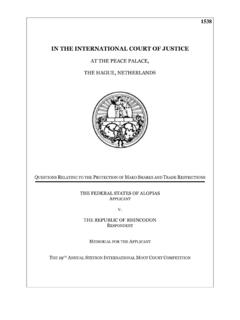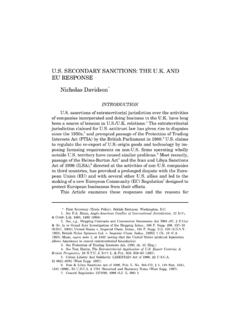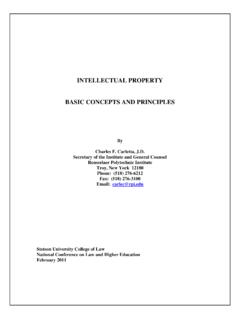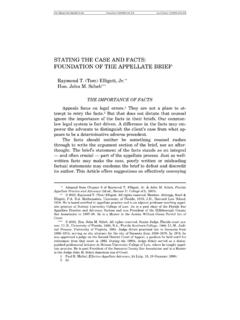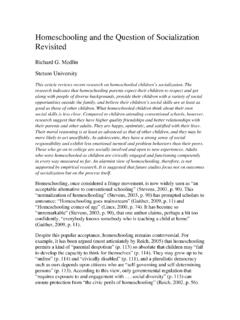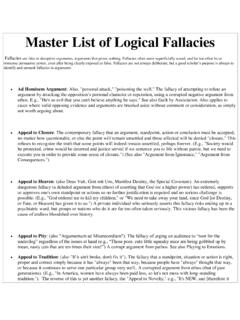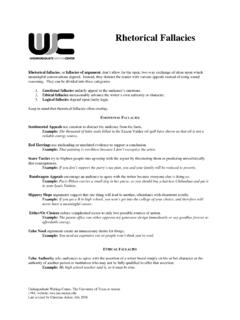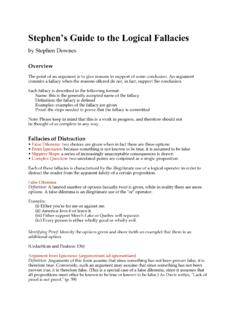Transcription of Chapter 4 – Identifying Fallacies - Stetson University
1 1 Logic: A Brief Introduction Ronald L. Hall, Stetson University Chapter 4 Identifying Fallacies Introduction Ludwig Wittgenstein once said that his aim in philosophy was to turn disguised nonsense into patent nonsense. What he was implying in this cryptic remark is that patent (obvious) nonsense, being easy to spot, is not as dangerously misleading as nonsense that is disguised as sense. Our task in this Chapter is to unmask some common cases of disguised nonsense. When we do, we will be less prone to fall for their illusion of sense. At one time or another, we have all had the illusion that some conclusion followed from a given set of premises when in fact it did not. We might have even acted on such an illusion. Logicians call such deceptive arguments, however psychologically convincing they may be, logical Fallacies . Some of these Fallacies occur so often and are so psychologically convincing that we need to be on special alert to avoid them.
2 The best way to do this is to identify (by name) examples of them, and to see exactly why the conclusions of such fallacious arguments do not follow from their premises. (There are a couple of exceptions to this rule. As we will discuss presently, the fallacy of complex question may not be formally invalid, but it is always invites bad reasoning. The other exception is the fallacy of begging the question, which is technically both valid and sound, but nevertheless a case of bad reasoning. I will say more about these exceptions in due course.) The list of Fallacies varies with different authors. Some, however, appear to be common to every list and our list includes most of these standard Fallacies . As well, our list divides the Fallacies into two general categories: Fallacies of Relevance and Fallacies of Ambiguity. Fallacies in the first category occur in those cases in which the content of the premises bears little or no logical relevance to the conclusion.
3 Fallacies of the second category occur in those cases in which a word, phrase, or passage has no clear meaning Fallacies of Relevance 1. Force When a speaker or writer formulates an argument it is usually with the intention of convincing some audience to accept its conclusion. For example, suppose someone tries to convince a group that it ought to play soccer instead of basketball. The reasons offered are as follows: (1) the basketball court is in bad shape, and (2) most in the group would rather play soccer than basketball anyway. Giving reasons for taking one course of action rather than another is, however, not the only way of trying to get an audience to accept a conclusion. Suppose the owner of the basketball and the soccer ball says that he thinks that the group ought to play basketball and further that if the group does not agree but wants to play soccer instead he tells them he will not allow the group to use his soccer ball.
4 We have now abandoned the technique of rational argument and entered the realm of coercion. And of course coercion is psychologically convincing and often works. Most likely the group will end up playing basketball. However, whenever a person attempts to coerce his or her audience to accept a conclusion on the basis of a threat, veiled or explicit, we say that a logical fallacy has occurred. We call this fallacy an appeal to force. (Sometimes this fallacy is referred to by its Latin name, Argumentum ad Baculum, which means argument from the stick. ) 2 It should be obvious to you that appeals to force, while psychologically convincing, are not valid arguments. Consider the difference between the following two attempts of parents to convince their child to go to college. A. You ought to go to college because it will broaden your horizons. B. You ought to go to college because if you don t we will disinherit you.
5 Clearly B is not offering a reason in support of going to college, but A is. Rather than offering reasons, B is attempting to coerce the child into attending. Whether the prospective student is in or out of his or her parent s will is logically irrelevant to whether going to college has or does not have merit. B has clearly abandoned logic in favor of force. 2. Ignorance. How many times have you ever heard someone say something like: Such and such must be true because nobody has ever proved it is false; or Such and such must be false because nobody has ever proved it is true. You can fill in the such and such with things like ghosts or God or aliens. However psychologically convincing it may be, the fact remains that nothing follows logically from the absence of proof. From the fact that nobody has ever proven that the proposition God exists is false, it does not follow that it is true; and from the fact that nobody has ever proven that the proposition God does not exist is true, it does not follow that it is false.
6 To reason this way is to commit the fallacy of appeal to ignorance (Sometimes this fallacy is referred to by its Latin name, Argumentum ad Ignorantiam.) We need to be careful, however, not to dismiss every appeal to a lack of evidence as committing this fallacy. Sometimes an absence of evidence can count as positive evidence. For example, if the termite inspector tells you that you do not have termites because there is no termite dust to be found on the beams under your house, he or she has not committed the fallacy of appeal to ignorance. And if the doctor says that the absence of a bull s eye marking around the tick bite site on your skin is evidence that you do not have Lyme disease, this is not a case of the fallacy of appeal to ignorance. The facts are that if I did have termites I would likely have termite dust on the beams under my house and if I did have Lyme disease I would likely have a bull s eye marking around the tick bite site on my skin.
7 These cases are very different from claims like, I do not have a soul because it has not been proven that I do. This conclusion simply does not follow. 3. Pity I hope that you are beginning to see why these Fallacies are classified as Fallacies of relevance. Indeed, the reasons that are given in support of the conclusions of the Fallacies of relevance are not logically relevant to the conclusion. What this means is that the truth of the conclusion is not guaranteed by the truth of the premises. In this light consider the following argument. You ought to change my failing grade on my logic test to a passing grade; for otherwise I will lose my basketball scholarship and I will have to drop out of college. Strictly speaking the appeal here is logically irrelevant to the conclusion, and yet it does carry psychological weight. In fact there have been college professors who have fallen for this appeal. Nevertheless, such arguments are fallacious.
8 Grades are intended to reflect the level of mastery the student has achieved in the subject, not the level of pity the Professor feels for the student. Pity is logically irrelevant to assessments of mastery. Logicians call Fallacies of this sort appeals to pity. (Sometimes this fallacy is referred to by its Latin name, Argumentum ad Misericordiam) Compare the argument above to this one: You ought to change my failing grade on my logic test to a passing grade, because the failing grade that I got reflects a calculation error that you made; if the points were accurately added, my grade would no longer be a failing one. In this case, the Professor has good reason to change the grade, while in the former case she does not. If we granted good grades on the basis of pity, grades would no longer measure the level of mastery of the subject that the student has achieved and hence would become meaningless.
9 3 4. Desire The fallacy of desire is not always included in lists of Fallacies . I include it here because we hear it so often. This fallacy is committed when someone concludes that such and such must be true because he or she would like it to be true. Consider the following example: Believing that I have a guardian angel that watches over me gives me all the comfort and security I want and need on the hard road of life. That s the reason that I believe I have one. Clearly this argument reaches its conclusion on the basis of wanting something to be true. Compare the following two arguments: It makes me depressed to think that we human beings are nothing but causally determined mechanisms. I would be so much happier if I thought we had the freedom to make at least some choices in life. Therefore I believe that we are free. It is not rational to believe x unless x is true and x is based on evidence that is accepted by the believer as warranting x.
10 In other words, rational beliefs are possible only for beings that possess the power of accepting or rejecting evidence. This power of acceptance or rejection is called freedom. If someone were to come to believe that human beings are merely causally determined mechanisms, then he or she must have accepted certain evidence as warranting this belief. However, it is possible to accept (or reject) evidence only if we are free to do so. Amazingly, even the claim that we are not free shows that we are. Therefore, I believe that we are free. What makes the first argument above a fallacy is that its conclusion is not guaranteed by the truth of its premises. This is not true in the second argument. The premises in this argument are logically relevant to its conclusion. Indeed, in this case it certainly seems obvious that the argument is valid, for if its premises were true then its conclusion would have to be true.
